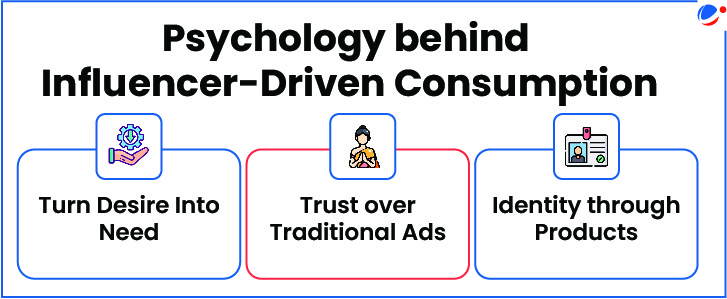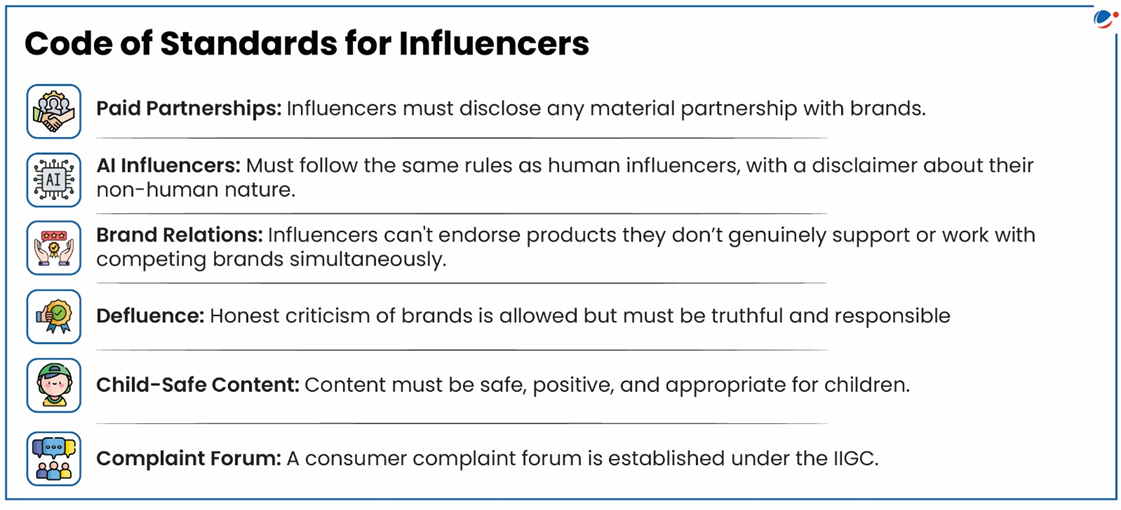Introduction
The digital age has reshaped not only commerce but also how people form identities and values. Platforms like Instagram and Facebook are now powerful tools for shaping desires and behaviors. What starts as casual content — fitness tips, lifestyle vlogs — often becomes a mix of aspiration, subtle manipulation, and consumerism. The line between genuine opinion and paid promotion is increasingly blurred.
India's influencer marketing industry is expected to grow rapidly, reaching ₹3,375 crore by 2026, highlighting the rising influence of digital creators (E & Y report).
Positive Role Played by Social Media Influencer to influence consumer behavior
- Promoting Social Change: Influencers raise awareness on mental health, body positivity, and women's rights.
- The Indian #MeToo movement, exposed workplace harassment and sparked reform.
- Conscious Consumerism: Some consumers are now resisting influencer marketing through a trend called "de-influencing," where influencers promote mindful spending and discourage unnecessary purchases.
- Inclusivity and Diversity: Several influencers challenge the gender stereotypes and represent marginalized voices, fostering acceptance and awareness.
- Access to Information: Officers use social media influencers to share updates, career tips, and public schemes, bridging the gap between governance and citizens.
Ethical Issues in Influencer Culture

- Mindless Consumption: Influencers often promote products as status symbols, not for need. This fuels materialism and undermines simplicity and sustainability—contradicting Gandhian ethics of self-restraint.
- Psychological Manipulation: By triggering fear of missing out (FOMO) and social comparison, influencers push impulsive consumption, especially among youth, eroding autonomy and informed choice.
- Lack of Accountability: Many influencers act as informal opinion leaders but face no checks, leading to consumer misinformation and fraud.
- Dishonesty: Plagiarizing content or failing to credit creators disrespects intellectual property and deceives followers, breaching ethical and legal norms.
- Privacy Violations: Large influencers collect and handle user data, often without proper safeguards—raising serious ethical and legal concerns.
- Harm to Mental Health: Idealized lifestyles online promote anxiety, low self-esteem, and dissatisfaction. From a utilitarian view, this diminishes collective well-being.
India's Regulatory Framework for Influencer Accountability
- Central Consumer Protection Authority (CCPA): It regulates matters relating to violation of rights of consumers, unfair trade practices and false or misleading advertisements.
- Securities and Exchange Board of India (SEBI): Banned partnerships between regulated financial entities and unregistered finfluencers to protect investors.
- Advertising Standards Council of India (ASCI): Released guidelines requiring influencers to clearly label paid promotions on digital platforms.
- Department of Consumer Affairs: Published 'Endorsement Know-hows' to help influencers and celebrities follow ethical and transparent promotion practices.
- India Influencer Governing Council (IIGC): Launched by Industry leaders, it is a self-regulatory body for Influencer marketing with members from major firms like Meta and Google.
- It recently introduced a Code of Standards and weekly influencer ratings (see infographic) to ensure transparency, accountability, and ethical content creation in India's digital ecosystem.

Way Forward:
- Clear Endorsement Rules: Influencers must follow guidelines like "Endorsement Know-Hows" that require clear labels such as "ad," "sponsored," or "paid promotion" to ensure transparency.
- Media Literacy: Integrate media literacy into school and college curricula to help young people critically assess online content and resist manipulation.
- Prioritize Credibility Over Popularity:Brands must move beyond follower count and assess an influencer's educational background, domain expertise, and audience relevance.
- Responsible Content Creation: Influencers should aim for value-driven storytelling that informs, educates, and respects audience intelligence.
Check your Ethical AptitudeIn recent years, the rapid growth of social media platforms has led to the rise of a new category of public figures—social media influencers. With this massive following, influencers have the power to shape public opinions, influence consumer behavior, and impact purchasing decisions in areas such as fashion, health, and lifestyle. On the basis of above case study
|



